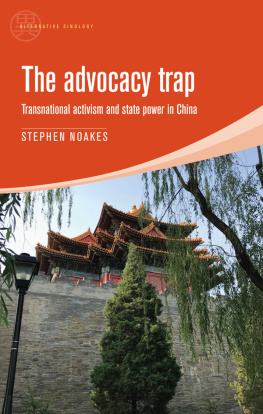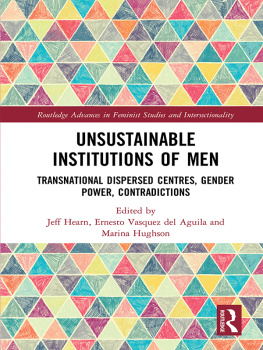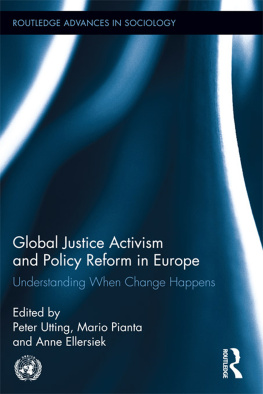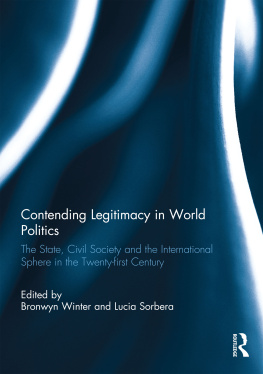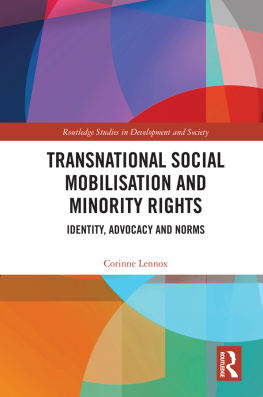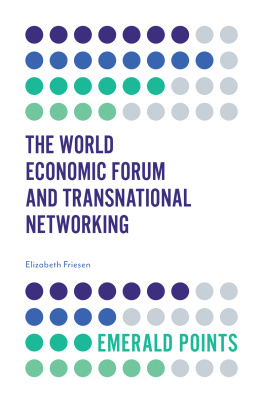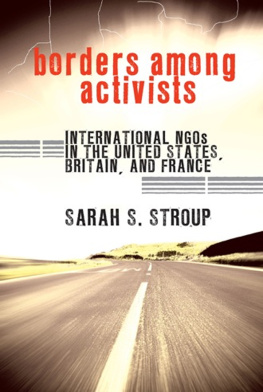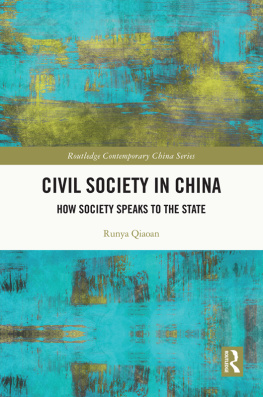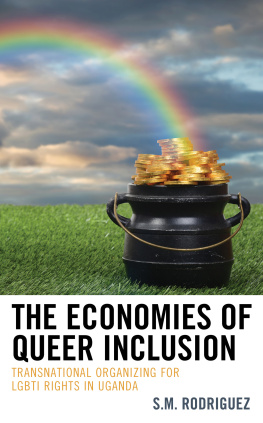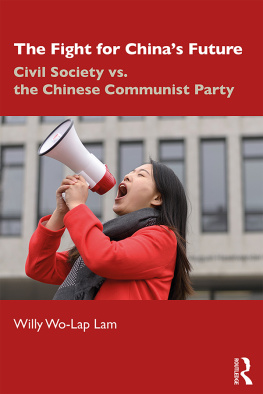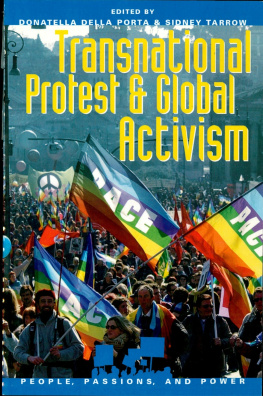Copyright Stephen Noakes 2018
The right of Stephen Noakes to be identified as the author of this work has been asserted by him in accordance with the Copyright, Designs and Patents Act 1988.
Published by Manchester University Press
Altrincham Street, Manchester m1 7ja
www.manchesteruniversitypress.co.uk
British Library Cataloguing-in-Publication Data
A catalogue record for this book is available from the British Library
ISBN 978 1 5261 1947 6 hardback
First published 2018
The publisher has no responsibility for the persistence or accuracy of urls for any external or third-party internet websites referred to in this book, and does not guarantee that any content on such websites is, or will remain, accurate or appropriate.
Typeset by Out of House Publishing
The study of China has in recent decades seen an explosion as many universities began to offer modules ranging from Chinese history, politics and sociology to urban, cultural and Diaspora studies. This is welcome news; the field grows when the world is hungry for knowledge about China. Chinese studies as a result have moved further away from the interdisciplinary tradition of Sinology towards more discipline-based teaching and research. This is significant because it has helped integrate the once-marginalised Chinese subjects into firmly established academic disciplines; practitioners should learn and grow within their own fields. This has also, however, compartmentalised Chinese studies as China scholars communicate much less with each other than before since they now teach and research in different departments; the study of China has lost some of its exceptionalism and former sheen.
Alternative Sinology calls for a more nuanced way forward. China scholars can firmly ground themselves in their own perspective fields; they still have the advantage of Sinology, the more holistic approach. The combination of disciplinary and area studies can help us innovate and lead. Now is an exciting time to take the study of China to new heights as the country has seen unprecedented change and offers us both hindsight and new observations. Alternative Sinology challenges China scholars. It calls on them to think creatively and unsettle the status quo by using new and alternative materials and methods to dissect China. It encourages them to take on understudied and marginalised aspects of China at a time when the field is growing and expanding rapidly. The case of China can promote the field and strengthen the individual discipline as well.
The advocacy trap: transnational activism and state power in a rising China launches the series. Post-Mao China opened its door to not just economic reform but also many transnational civil organizations, from HIV/AIDS prevention to environmental protection groups. Doing business with an authoritarian state is precarious. How such groups engage with a rising economic superpower that has not played by their rules, and increasingly would like to set its own, makes a fascinating study. The book probes how China has dealt with these global activist networks and their operations; it argues for what the author terms advocacy drift. Instead of insisting on their iron principles, transnational advocacy groups have learnt to negotiate and accommodate in order to achieve their larger goal. This is significant because these transnational civil society organisations have been persuaded; it reveals Chinas ability to set its own rules. This level of dynamics and complexity will have implications for many in the decades to come as China rises to challenge the worlds norm-setters.
Zheng Yangwen and Richard Madsen
This book was made possible by a transnational network of committed supporters. I am particularly indebted to Bruce Gilley and Kim Nossal, and to Joe Wong at the University of Toronto for their unfailing words of wisdom. Many others in the Canadian, US, UK, Australian, Chinese, and Kiwi academies have shaped the project in ways big and small. In no particular order, I wish to thank Edward Friedman, Bill Hurst, Bernie Frolic, Wendy Wong, Jessica Teets, Elizabeth Perry, Joe Fewsmith, Lynette Ong, Andrew Mertha, Victor Shih, Kathryn Sikkink, Sidney Tarrow, Dave Zarnett, Richard Madsen, Zheng Yangwen, Tom Dark, Alun Richards and all at Manchester University Press, Zsuzsa Csergo, Scott Matthews, David Haglund, Wayne Cox, Wenran Jiang, Dru Lauzon, Brandon Tozzo, Rmi Lger, Roxanne Razavi, Paul Clark, Hilary Chung, Mark Mullins, Melissa Inouye, Tom Gregory, Julie MacArthur, Gerald Chan and all my colleagues at the University of Auckland, Hyung Gu Lynn, Zhang Zhiyao, Charles Burton, Andr Lalibert, Marc Lanteigne, He Baogang, Guo Dingping, Ren Junfeng, Tim Cheek, Paul Evans, Fu Tao, the China Development Brief, John Kielty, Wang Limin, Richard Choi, Marguerite Luong, Victor Radujko, Peter Henshaw, Caylan Ford, Jared Pearman, Ken and Lolan Merklinger, Tim Roxburgh, Kimberley Manning, and Emily Hill.
Faculty and staff at Fudan Universitys School of International Relations and Public Affairs, which served as a base of operations for field research in China, showed me incredible hospitality. Jing Yijia, Sang Yucheng, and Wang Yangyang all deserve special mention. Thanks also go to Jennifer Falle, Amelia Ponte-Vivieros, Barb Murphy, Jeananne Vickery, Karen Vandermey, Frances Shepherd, Eileen Lam, Amy Dutton, Laura Bunting, Lisa Jagoe, Ali Bensemann, Jane Kim, Adam White, Anna Ma, and Yvonne Hannah for their capable research assistance and administrative support. Financial contributions the Social Sciences and Humanities Research Council of Canada, the R. S. McLaughlin Fellowship, and the Timothy C. E. S. Franks Research Travel Grant are gratefully acknowledged. A further debt is owed to my students at Queens, the University of Toronto, and the University of Auckland, whose curiosity and enthusiasm for studying Chinas politics moved me to investigate angles I had not thought of previously and kept me buoyant week after week.
Last, but certainly not least, I wish to express my gratitude to family and friends, especially Sarah, for her patience with me during the final push (Yes, I do think you will finish your book. Yes, I think it will be fine), and my children, Ezra and Nori, who keep me focused on what really matters. My parents Don and Jan Noakes, my sister Shannon, Scotty Young, Jack Noakes, Ryan Edwardson, Keren Bromberg, Scott Wilson, Keren, Christina Dabrowski, Jeff, Heather, and Jordan Wilson, Brian and Diane Wilson, Murray and Heather Kennedy-MacNeill, Dorothy MacNeill, Sophie and Emma MacNeill, Paul and Rosemary Morrison, Neel Jethwa, Adrian Elliot, Ross Cameron, Jessica Davis, Sam Young, and Marin Mutiny McGinnis all deserve to be singled out because of the love, good company, meals, and occasional overnight accommodation they provided.

